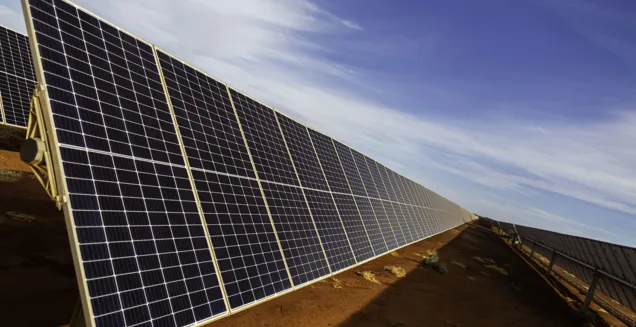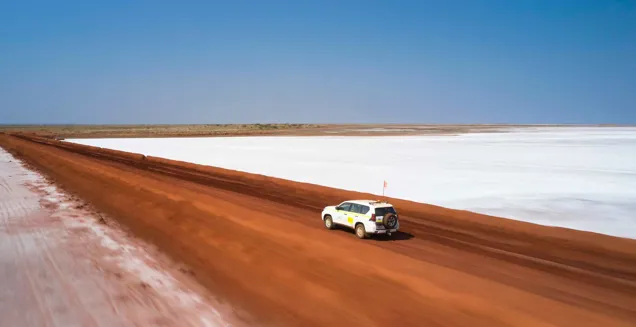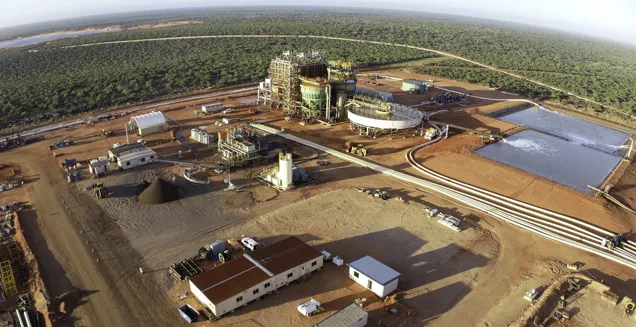Thunderbird Mineral Sands Project
Discover the Thunderbird Mineral Sand Project in the Kimberley region of Western Australia. Supported by a NAIF loan, this project will generate economic benefits, create jobs, and support Indigenous engagement.
March 2022
Resources
West Kimberley, WA

NAIF approved up to $160 million in finance to support Kimberley Mineral Sands in developing the Thunderbird Mineral Sands Project in Western Australia’s Kimberley region. This investment decision helped unlock one of the world’s most significant zircon-rich deposits. Now operational, the project is supplying zircon and titanium feedstocks to global markets while creating long-term economic and community benefits for northern Australia.
About Kimberley Mineral Sands
Kimberley Mineral Sands Pty Ltd (KMS) is a joint venture between Sheffield Resources Limited and Yansteel, established to develop and operate the Thunderbird Mineral Sands Project on the Dampier Peninsula in northern Western Australia.
Project Overview
The Thunderbird Mineral Sands Project, located on the Dampier Peninsula between Broome and Derby, is one of the world’s largest and highest-grade zircon-rich mineral sands deposits. Construction of Stage 1 commenced in October 2022, and the project became operational in January 2024.
Thunderbird will generate a high-quality suite of mineral sands concentrate products. These products include a zircon concentrate and a magnetic concentrate that contains a high-quality ilmenite suitable for smelting into chloride slag or for manufacturing titanium dioxide pigment.
The development encompassed major infrastructure works, including an open-cut mine with a wet concentrator plant, processing facilities, an accommodation village, site access roads, power generation, and water management systems.
Global demand for zircon and titanium feedstocks is projected to grow steadily, driven by construction, advanced manufacturing and renewable energy. Australia currently supplies around one-third of the world’s zircon, positioning Thunderbird as a major new long-life source of critical minerals to international markets.
How We Helped
We provided concessional finance with longer loan tenors and flexible terms. This support gave KMS the certainty to proceed with the Thunderbird Mineral Sands Project.
We played a critical role in de-risking the project by aligning finance with the life of the mine and its infrastructure, while also encouraging private investment through early support.
Through this tailored approach, we helped unlock new critical minerals capacity and long-term economic benefits for the Kimberley region.
Public Benefit
Over the construction period and first 20 years of operations, the project is forecast to generate an increment to northern Australia’s real Gross Regional Product of $1.85 billion in present value terms. The project is also forecast to generate 225 new jobs in northern Australia during construction and 345 ongoing operational roles for the life of the mine.
As part of its Indigenous Engagement Strategy, KMS has committed to achieving strong Indigenous employment, business and social outcomes in the region. The company is working with the Joombarn-buru Traditional Owners and collaborating with key Indigenous organisations across the West Kimberley. The IES covers obligations on supporting economic benefits through employment and business contracts, cultural heritage protection, environmental management, cultural awareness training, and a social impact assessment.
Sheffield is extremely pleased by the level of support shown by NAIF and the Federal Government for the Thunderbird Mineral Sands Project. The NAIF commitment will enable KMS to finalise project funding requirements for Thunderbird and progress construction activities, with the aim of delivering first production in early 2024
Bruce Griffin
Executive Chair, Sheffield Resources
Related Links
Indigenous Engagement
- The Jabirr Jabirr-Ngumbarl, Nyikina, Nimanburr, Yawuru, Nyul Nyul and Warrwa peoples
The Joombarn-Buru Aboriginal Corporation (JBAC), holds Native Title over the area that the Thunderbird mine is located. JbAC works to preserve cultural heritage, promote economic development, and deliver community initiatives. Their deep cultural knowledge and connection to country spans coastal ecosystems, river systems, and inland ranges, all rich in biodiversity and cultural significance. For generations, Traditional Owners across the West Kimberley have used sophisticated knowledge of country to navigate land and sea country. Today, through JBAC, the Traditional Owners continue to uphold their cultural responsibilities while engaging in opportunities that ensure self-determination and sustainable development on their lands.
Indigenous Engagement Strategy Commitments
The Thunderbird Project Coexistence Agreement (TPCA) contains the below requirements:
- Commit to First Nations employment targets of 10% by year two, 25% by year four, 40% by year eight of operations, prioritise Joombarn-Buru Traditional Owners, establish an Aboriginal Training Fund, and provide mentoring support to traditional owner employees.
- Prioritise First Nations contractors starting with Joombarn-Buru Traditional Owners when awarding up to $5m annually in construction and $10m in operational contracts, while establishing a Business Development Committee and a register of First Nations businesses.
- Support an Agreement Implementation Committee (IC) comprising Joombarn-Buru Aboriginal Corporation (JBAC) and KMS representatives to oversee the implementation of the TPCA.
- KMS in partnership with JBAC, conduct an Aboriginal Social Impact Assessment, including a community skills audit, to inform employment, training, and development strategies aligned with best practice models.
- Implement a Communication Strategy with regular reporting to the Implementation Committee on employment, procurement, and training outcomes, and continued engagement with the Joombarn-Buru community.
- Employ at least two Joombarn-Buru Rangers, and work closely with Traditional Owners on heritage surveys, cultural awareness training, and caring for country.
Indigenous Engagement Strategy Outcomes
- As of 31 March 2025, the Thunderbird workforce employed by KMS and its primary contractors totalled 401, with 22% identifying as Aboriginal, 17% as female, and 50% residing in the Kimberley. Among the workforce, 21 employees identified as Joombarn Buru.
- Since operations commenced in October 2023, KMS has spent $77 million with Aboriginal businesses, including $12.37 million with Joombarn Buru Traditional Owner businesses and $23.04 million with other Aboriginal businesses based in the Kimberley region.


